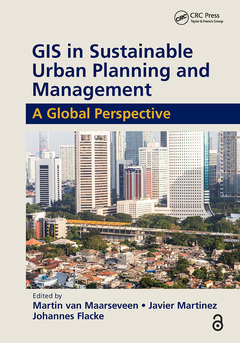Description
GIS in Sustainable Urban Planning and Management
A Global Perspective
Coordinators: van Maarseveen Martin, Martinez Javier, Flacke Johannes
Language: English
Subjects for GIS in Sustainable Urban Planning and Management:
Keywords
Urban Heat Islands; Spatial data; Urban QoL; GIScience; Land Cover Fraction Map; Geo-information; QoL Satisfaction; Urban Planning; Cellular Automata; Cities; Data Poor Context; Remote Sensing; VGI Data; Martin van Maarseveen; Jawaharlal Nehru National Urban Renewal; Javier Martinez; Computer Assisted Qualitative Data Analysis; Johannes Flacke; Infill Growth; Rehana Shrestha; Qualitative GIS; Mark Zuidgeest; Junction Scores; Jose Morales; SDSS; Shubham Mishra; Built Environment Attributes; Monika Kuffer; Urban Growth Models; Karin Pfeffer; Street Connectivity; Razieh Zandieh; SLR; Marija Kukoleca; Evacuation Shelters; Ana Mafalda Madureira; Potential Resettlement Sites; Elsa Sereke Tesfazghi; Turkish Cypriots; Jeroen Verplanke; VGI; Jowan Khorsheed; Cellular Automata Model; Haifa AlArasi; Sustainable Housing Development; Sherif Amer; Urban Thermal Environment; Bolatito Dayo-Babatunde; Social Vulnerability Indicator; Alphonce Gabriel Kyessi; Sunita Duwal; Amy Butler; Mark Brussel; Glen Koorey; Rushikesh Kotadiya; Richard Sliuzas; Sejal Patel; Yamini Jain Singh; Yohannes Kinskij Boedihardja; Frans van den Bosch; Anna Grigolon; Eduardo Pérez-Molina; Adya Ninggar Laras Kusumo; Diana Reckien; Alice Nikuze
Publication date: 01-2023
· 17.8x25.4 cm · Paperback
Publication date: 01-2019
· 17.8x25.4 cm · Hardback
Description
/li>Contents
/li>Biography
/li>
The Open Access version of this book, available at http://www.tandfebooks.com/doi/view/10.1201/9781315146638, has been made available under a Creative Commons Attribution-Non Commercial-No Derivatives 3.0 license.
GIS is used today to better understand and solve urban problems. GIS in Sustainable Urban Planning and Management: A Global Perspective, explores and illustrates the capacity that geo-information and GIS have to inform practitioners and other participants in the processes of the planning and management of urban regions. The first part of the book addresses the concept of sustainable urban development, its different frameworks, the many ways of measuring sustainability, and its value in the urban policy arena. The second part discusses how urban planning can shape our cities, examines various spatial configurations of cities, the spread of activities, and the demands placed on different functions to achieve strategic objective. It further focuses on the recognition that urban dwellers are increasingly under threat from natural hazards and climate change.
Written by authors with expertise on the applications of geo-information in urban management, this book showcases the importance of GIS in better understanding current urban challenges and provides new insights on how to apply GIS in urban planning. It illustrates through real world cases the use of GIS in analyzing and evaluating the position of disadvantaged groups and areas in cities and provides clear examples of applied GIS in urban sustainability and urban resilience.
The idea of sustainable development is still very much central in the new development agenda of the United Nations, and in that sense, it is of particular importance for students from both the Global South and Global North. Professionals, researchers, and students alike will find this book to be an invaluable resource for understanding and solving problems relating to sustainable urban planning and management.
Urban Planning and Management: Geo-Information Applied to Cities. The Sustainable and Inclusive City. Towards Low Carbon Development. An Exploration of Environmental Capital in The Context of Multiple Deprivations. Development of Environmental and Health Indicators Related to Inequalities. Sustainable Development by Means of a Collaborative Planning Framework. Evaluating the Role of Public Spaces in Promoting Social Interaction in Divided Cities. Are Socio-Economically Disadvantaged Communities, Ill and Costly? Urban Quality of Life and Its Spatial Distribution. City Morphology and Women’s Perception of Travel. Children's Perception of Their City Center: A Qualitative GIS Methodological Investigation. The Compact-Competitive and Resilient City. Modelling Informal Settlement Growth. Developing A Walkability Index for The Assessment of Nodes in a Transit-Oriented Development. Modelling Urban Growth. Multiple Criteria Bicycle Route Assessment Integrating Demand, Supply & Stakeholder Perceptions for A Spatial Decision Support System. Post Resettlement Dynamics of Socio Economic Pattern. National Urbanization Policy Development and Implementation with The Emerging Spatial Development Framework of Competitive and Complementary Cities. Performance Preferences and Policies in Urban Water Supply. Modelling Urban Growth and Flooding Interactions with Cellular Automata. Utilizing Volunteered Geographic Information to Assess Community's Flood Evacuation Shelters. Towards Equitable Urban Residential Resettlement.
Martin van Maarseveen is a full professor in Management of Urban-Regional Dynamics and Head of the Department of Urban and Regional Planning and Geo-Information Management at ITC, University of Twente, The Netherlands. He obtained an MSc degree with distinction in Applied Mathematics in 1976, and a PhD degree in Stochastic Systems and Control Theory in 1982, both at the University of Twente. From 1980 till 1989 he was a senior researcher in transport planning and traffic management at TNO, the Netherlands Organization for Applied Scientific Research, in Delft. In 1989 he returned to the University of Twente to become one of the founding fathers of the School for Civil Engineering & Management and Head of the Centre for Transport Studies. From 1995 till 2008 he was a full professor in Strategic Transport Planning and Sustainable Development. Since 2003 he is also a guest lecturer in Transport Planning, Modelling and Assessment at the University of Cape Town, South Africa. In his current position he focuses on the application of Geo-Information Science in the field of Urban Planning and Management in education, research and projects. He has a vast experience in international projects all around the globe, and is author of more than 200 scientific and professional publications.
Javier Martinez is Assistant Professor in the Department of Urban and Regional Planning and Geo-Information Management at ITC, University of Twente, the Netherlands. He graduated as an architect from the Faculty of Architecture, Planning and Design (UNR) Rosario, Argentina and obtained his MSc degree in geo-information for urban planning from ITC, University of Twente. He received his PhD from the Faculty of Geographical Sciences, Utrecht University. Between 1999 and 2001, he worked Argentina in the Strategic Plan Rosario office (PER) designing its Urban Indicators System. He has published research papers and book chapters in the application of GIS and indicators for policy making,




